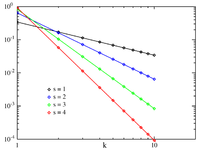
Photo from wikipedia
ABSTRACT Clustered binary responses are often found in ecological studies. Data analysis may include modeling the marginal probability response. However, when the association is the main scientific focus, modeling the… Click to show full abstract
ABSTRACT Clustered binary responses are often found in ecological studies. Data analysis may include modeling the marginal probability response. However, when the association is the main scientific focus, modeling the correlation structure between pairs of responses is the key part of the analysis. Second-order generalized estimating equations (GEE) are established in the literature. Some of them are more efficient in computational terms, especially facing large clusters. Alternating logistic regression (ALR) and orthogonalized residual (ORTH) GEE methods are presented and compared in this paper. Simulation results show a slightly superiority of ALR over ORTH. Marginal probabilities and odds ratios are also estimated and compared in a real ecological study involving a three-level hierarchical clustering. ALR and ORTH models are useful for modeling complex association structure with large cluster sizes.
Journal Title: Journal of Applied Statistics
Year Published: 2017
Link to full text (if available)
Share on Social Media: Sign Up to like & get
recommendations!